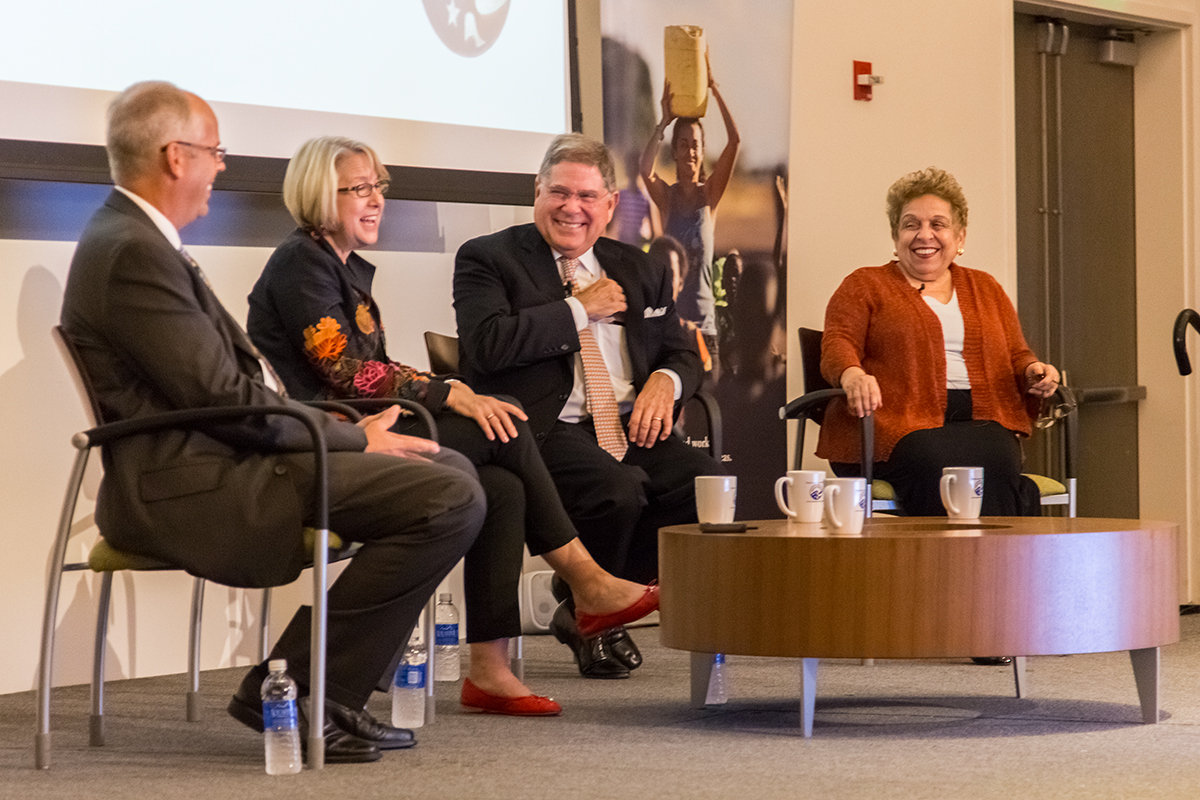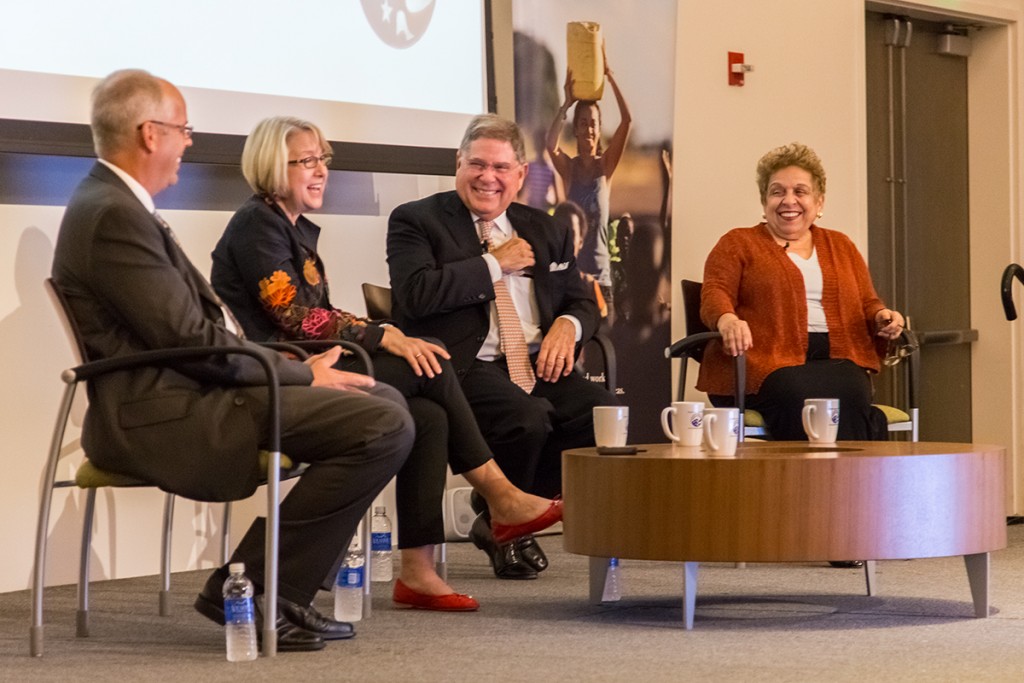

University of Miami President Donna E. Shalala and president of the Knight Foundation, Alberto Ibargüen, joined Peace Corps Director Carrie Hessler-Radelet Wednesday evening to discuss how their individual experiences as Peace Corps volunteers shaped their lives and careers.
The discussion was led by Steve Hunsicker, a South Florida field-based recruiter for the Peace Corps. Hunsicker worked in the Peace Corps as a volunteer in Tonga from 2007-09.
The Peace Corps sends American volunteers abroad on behalf of the United States to tackle pressing needs of people in other countries. Volunteers typically live and work in the country that they’re sent to for two years. The agency was established by President John F. Kennedy in 1961.
The University of Miami, a long-time supporter of the Peace Corps, was most recently ranked 24th nationwide for Peace Corps volunteers with 13 alumni currently in service and 396 alumni who have served since the agency’s founding.
Shalala worked in the Peace Corps as a volunteer teaching at an agricultural college in Iran from 1962 to 1964.
Her trip to Iran was the first time that she had traveled abroad. She said that her experience in the Peace Corps made her “a citizen of the world.”
Shalala recalled that her parents were not initially supportive of her choice to join the Peace Corps. Her father offered her a new car if she would not go to Iran, but she turned the offer down.
“What it really did for me was it opened up the world,” Shalala said. “I know what poverty smelled like. I know how those people struggle to take care of their families.”
Shalala said that she learned how to listen in the Peace Corps.
“If there’s anything that the Peace Corps encourages us to do, it’s to listen and observe,” she said.
This was in line with the advice that Shalala gave Dr. Julio Frenk, the newly named UM President. She said that her advice to him was to “shut up and listen” to the students and faculty of the university.
Hessler-Radelet worked in the Peace Corps as a volunteer teaching English at a secondary school in Western Samoa from 1981-83. She comes from a family with history in the Peace Corps. Her aunt was a volunteer in Turkey and her grandparents were volunteers in Malasia.
Hessler-Radelet accredited her experience in the Peace Corps with the discovery of her passion within the public health profession.
While working in Western Samoa, she became connected with a Samoan woman who was beginning her ninth pregnancy at the age of 32. The woman had birthed her first child when she was 15 years old.
Hessler-Radelet took the Samoan woman to a health facility nearby and introduced her to a midwife who would eventually help to deliver the woman’s ninth child.
After birthing her ninth child, the Samoan woman suffered from postpartum hemorrhaging. Hessler-Radelet said that the midwife saved the woman’s life, and had they never gone to the health facility the Samoan woman would have died.
Hessler-Radelet was inspired by the Samoan woman and the midwife to get into the field of public health. She ended up having 20-year-long career in the field.
“That midwife was my key to be able to apply [public health] elsewhere,” said Hessler-Radelet.
Ibargüen grew up in South Orange, a suburban town in New Jersey. He worked in the Peace Corps as a volunteer and leader in Venezuela from 1966-68, and then as a programming and training officer in Colombia 1969-71.
Ibargüen said that the most often Peace Corps volunteers don’t receive jobs that resemble an American “nine to five” job. He said that the jobs are engaged with the community and aren’t meant to have set stopping times, and that volunteers become a part of the local community during their Peace Corps experience.
Ibargüen said that the greatest takeaways from his experience were the skills he gained and what he learned during his experience.
“The greatest beneficiary of my two years in the Peace Corps was me,” he said.
Shalala said that she tries to convince undergraduate students not to go straight to graduate school after they get their bachelor’s degrees.
“I beg them not to,” she said.
Directly after she graduated from Western College for Women, Shalala spent two years volunteering with the Peace Corps in Iran, and then another year “wondering around the world.”
Shalala said that she encounters trouble when she encourages students at the university to volunteer.
“Students and their parents think they’re going to fall behind their generation if they spend two years in the Peace Corps,” she said.
Shalala assured students that they would not miss a thing, and that they should have an adventure. This was the reason why she joined the Peace Corps instead of attending law school or graduate school right after college, she said.
“When people ask me what’s the best job I ever had, it’s the Peace Corps job,” Shalala said. “With all the other stuff that’s on [my] resumé, that’s boring compared to the Peace Corps.”
“One of the things that I’ve notice that Peace Corps volunteers are able to do is to help other people discover their own potential and begin to have confidence in themselves,” Hessler-Radelet said.
Hessler-Radelet described the common experience of volunteers as a rollercoaster ride.
“You’re going to have the highest highs and the lowest lows you’ve ever had, and you just have to be ready for that,” Hessler-Radelet said.
Hessler-Radelet elaborated on the common experience, describing that the volunteer is initially on a high in the first couple months, and then hits a low as he or she starts missing home or doubting him or herself. The volunteer finds him or herself hitting other highs during the experience as they connect with more people and participate in pleasantly memorable moments.
“I think most of us underestimate the impact that we have,” said Hessler-Radelet. “Because a lot of the time our impact that we have takes many years to manifest itself.”
Both Hessler-Radelet and Shalala agreed that the impact of the Peace Corp experience is best measured by the stories from the volunteers and the people they interacted with during their volunteering.
“Life is transformed by service,” Hessler-Radelet said. “You don’t have to be in the Peace Corps to be transformed by service.”





